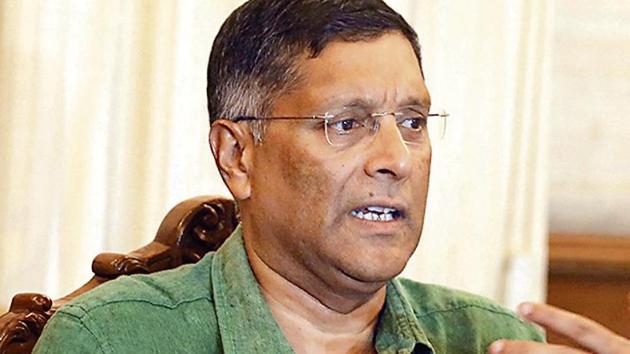No magic wand to solve India’s jobs crisis, says Arvind Subramanian
Subramanian says due to less suitable global economic scene, reaching double-digit growth will need more hard work
The announcement that Arvind Subramanian, India’s Chief Economic Advisor (CEA), is quitting for personal reasons to return to the United States has generated considerable attention. The CEA spoke to Prashant Jha about his time in government and the state of the economy:

As you look back, what are the key highlights and the big regret you have from your tenure?
There were some major highlights: the constitutional amendment on the GST (Goods and Services Tax), the early diagnosis of the twin balance sheet issue; pushing the ideas of stigmatised capitalism, carbon imperialism, universal basic income, bad banks and more. But I think presenting economic surveys and elevating the content, presentation and articulation of economic policy making would rank high.
My regret is that there were lots of demands from states to replicate the office of the CEA. Four-five chief ministers had spoken to me about it and were keen. We were not able to do it.
Do you think the economy is in a better or a worse shape compared to when you arrived?
We did lots of reforms. But the global economic environment is a lot less favourable than it was when I first came in. That means we have to work hard to achieve the target of double-digit growth.
Some experts cite demonetisation as the one big economic mistake the government committed during your tenure. Was it?
That’s something I will let others answer. I would not like to comment on it.
What is biggest thing India needs to do on the economic policy front, and one thing it must avoid?
I think we need to crack the twin balance sheet problem. A lot of work has been done. But a lot of work needs to be done to overcome the problems emerging from stigmatised capitalism, and addressing the structural issues in the banking sector.
What we must avoid is risking the hard-earned macroeconomic stability.
You have been an academic all your life. What excited you the most about being in government and what frustrated you?
I was excited all the time, 24x7 - whether it was the big policy issue of the day, the outreach, the surveys, even the lows, the opportunity to be able to closely communicate with the finance minister, Prime Minister’s Office (PMO), Prime Minister. Every academic dreams of being in the world of policy making and this was incredible.
And frustrating?
One cannot expect everything you want to get done. Politicians have their own reasons for not doing things. And one has to understand that.
Arun Jaitley wrote an exceptionally warm blog to announce your departure. How was your experience with him?
It was an extraordinarily special relationship. The one thing about him is that he is very comfortable in his own skin. I had the liberty to say anything to him; I often went in to his room six times a day. He would allow you that space; he would listen; he was never defensive or edgy. It was based on shared trust and respect. He is a dream boss.
There is speculation that Rashtriya Swayamsevak Sangh affiliates wanted you out.
I have no clue where this is coming from. This was a completely personal decision. I have been in discussion with Mr Jaitley and PMO on this for a few months. There is no conspiracy theory here.
Indian economy’s biggest crisis remains jobs. What do we need to do?
There is no magic wand. We need to focus on growth, investment, and exports. The jobs will follow. We have a window for this before technology squeezes the space for it.






